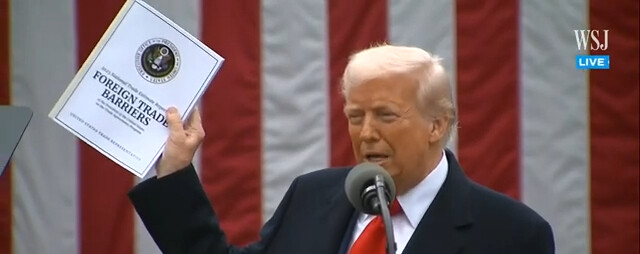President Donald Trump’s goal of reciprocal trade is a false promise, based neither on economic laws nor market reality. His arbitrary tariffs are causing an immediate meltdown of the world’s financial markets and a loss of confidence in the American government.
Some will state that what Trump is doing is a matter of negotiation — a negotiating position. My response: this is brinkmanship, which is unproductive. Trump’s continuous threats to China will lead to trouble and will not improve free trade. (RELATED: America’s Tariffs: Clear Losers, but Decoupling From China)
In 1817, economist David Ricardo established the principle of “Comparative Advantage,” which is the basis for free trade. Comparative Advantage is the ability to produce a product or service at a lower cost than another producer. Production is thereby shifted, under free trade, to those with comparatively lower costs of production. Saudi Arabia can produce oil for $10 a barrel, while in the United States, the cost is $25 to $60 for the same barrel, which means that Saudi Arabia has a major comparative advantage.
Although free trade tends to destroy jobs in which the nation has a comparative disadvantage, it creates jobs in which the nation has a comparative advantage. Tariffs and other protectionist measures have the opposite effect. (RELATED: Presidents Are Not Economic Magicians)
The Smoot-Hawley Tariff Act of 1930 ushered in high tariffs, led to a major loss of international trade, and was a contributing factor to the Great Depression. In 1931, imports were only 3.5 percent of the economy; today, imports are 11 percent of the U.S. economy, which means high tariffs will undermine growth and increase costs on virtually every product, even those made in the United States.
Tariffs were a major source of U.S. federal revenue in the 19th century before the income tax was enacted in 1913. While the federal government was relatively small in the 19th century, it’s now massive. Tariff-taxes therefore only account for 1.6 percent of the federal budget but severely harm consumers and reduce our international competitiveness.
Trade wars cause great harm, as every country loses, potentially leading — in the worst case — to an actual hot war. Recently, President Trump threatened to increase tariffs on China by 50 percent. This is how trade wars work; neither party wants to back down.
In America, thanks to our Constitution, any trade between individuals living in different states is tariff-free. Notions of domestic trade being fair or balanced are, therefore, nonissues, and we are nonetheless the wealthiest country in the world. The European Union, comprised of 27 countries, likewise established free trade and is thus the second-largest economy in the world.
If the United States, Mexico, and Canada simply adopted unilateral free trade, every person would be enriched due to low-cost production and high-quality products.
American manufacturers rely on parts and components from hundreds of countries. While acting in their own interests, trading partners nonetheless create value for one another. Relatively free trade has ultimately made America the wealthiest country in the history of the world.
Here are additional key facts to keep in mind:
- The U.S. Constitution provides taxing authority to Congress and therefore Trump does not have the legal authority to massively increase tariffs.
- The United States is a consumer-driven economy, which means it will typically have a trade deficit, so long as the money value of imports exceeds the money value of exports in the current period. The trade deficit does not matter. We exchange dollars for products we need. Dollars either return as demand for U.S. exports or as investment in the United States. A trade deficit thus indicates that foreigners consider the United States to be an especially attractive destination for investment.
- The United States does not have the will or human resources to manufacture all the components we need. Most American families do not want their children working in manufacturing. For it to be worthwhile, a manufacturing job must meet or exceed the value of the next best employment opportunity the individual would otherwise pursue.
- Reshoring manufacturing is not the solution because our cost to produce in the United States is substantially higher than world prices. U.S. taxation, including tariffs and regulations, makes it very difficult to manufacture domestically.
Exports will also suffer due to higher component costs for domestic manufacturers versus international competitors. A good example is President Trump’s 25 percent steel tariffs in 2018, which caused domestic producers to raise prices up to 60 percent. Our government bankrupted an important stainless-steel producer due to tariffs on stainless steel slabs. (RELATED: Steel Prices Are Up 215 Percent — Blame the Tariffs)
My company, CaptiveAire, is a leading U.S. manufacturer of cutting-edge HVAC technologies, which require components from four continents, including motors, compressors, electronics, leading-edge machines, tools, and Italian production equipment. In most cases these products will never be made in America.
Unilateral free trade would benefit the United States and make our exports more competitive. Free trade simply means buying from the lowest-cost producers, which makes our automobiles, food, and almost every consumer product more competitive.
This is a clarion call to Congress to assert its constitutional responsibility to establish and control tariffs. If Congress acts, it will restore international confidence in the American government, foster American exceptionalism, and reestablish America as the moral leader of the free world.
Bob Luddy is the founder and CEO of CaptiveAire Systems. Michael Romero, Ph.D., is a professor of economics at Thales College.
READ MORE:




![Jasmine Crockett Justifies Mass Illegal Immigration With Bizarre Argument [WATCH]](https://www.right2024.com/wp-content/uploads/2025/03/1742007023_Jasmine-Crockett-Justifies-Mass-Illegal-Immigration-With-Bizarre-Argument-WATCH-350x250.jpg)


![NYC Tourist Helicopter Falls into Hudson River, Siemens Executive and Family Among Those Killed [WATCH]](https://www.right2024.com/wp-content/uploads/2025/04/NYC-Tourist-Helicopter-Falls-into-Hudson-River-Siemens-Executive-and-350x250.jpg)








